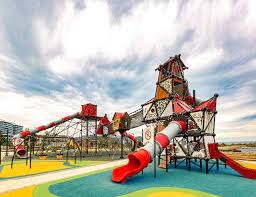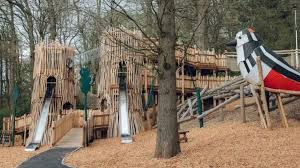
Exploring the Magic of Playground Adventures
The Importance of Playgrounds for Children
Playgrounds are more than just a place for children to have fun – they are essential for their development and well-being. Here are some reasons why playgrounds play a crucial role in a child’s life:
- Physical Health: Playgrounds provide children with the opportunity to engage in physical activities such as running, jumping, climbing, and swinging. These activities help children develop motor skills, coordination, and strength.
- Social Skills: Playgrounds are social hubs where children can interact with their peers, make friends, and learn important social skills such as sharing, taking turns, and resolving conflicts.
- Creativity and Imagination: Playgrounds stimulate children’s creativity and imagination by offering diverse play structures, open spaces, and natural elements that encourage imaginative play.
- Mental Well-being: Playing outdoors in playgrounds has been linked to improved mental health in children. The fresh air, sunshine, and physical activity help reduce stress, anxiety, and promote overall well-being.
- Cognitive Development: Playgrounds offer cognitive challenges that help children develop problem-solving skills, spatial awareness, and critical thinking abilities through play.
In today’s digital age where screen time often dominates children’s activities, playgrounds provide a much-needed space for physical activity and social interaction. They offer a break from technology and allow children to engage with the world around them in a meaningful way.
It is important for communities to invest in well-designed playgrounds that cater to the diverse needs of children of all ages and abilities. By providing safe and stimulating play environments, we can support the holistic development of our future generation.
So next time you see a playground filled with laughter and joy, remember that it is not just a place of play – it is a vital space where children learn, grow, and thrive.
Five Key Benefits of Playgrounds for Children’s Development and Well-being
- Playgrounds promote physical activity and exercise, helping children stay active and healthy.
- Playgrounds provide opportunities for social interaction, helping children develop communication and teamwork skills.
- Playgrounds stimulate creativity and imagination through open-ended play experiences.
- Playgrounds offer a safe environment for children to explore, take risks, and build confidence.
- Playgrounds contribute to the overall well-being of children by providing a space for fun, relaxation, and stress relief.
Four Concerns About Playgrounds: Safety Risks, Bullying, Accessibility Challenges, and Maintenance Shortcomings
- Risk of accidents and injuries due to falls or collisions on playground equipment.
- Potential for bullying or conflicts among children in a playground setting.
- Limited accessibility for children with disabilities or special needs in some playgrounds.
- Maintenance issues such as broken equipment, lack of cleanliness, or safety hazards.
Playgrounds promote physical activity and exercise, helping children stay active and healthy.
Playgrounds serve as dynamic spaces that actively promote physical activity and exercise among children, fostering a culture of movement and play. By engaging in various activities such as running, climbing, swinging, and jumping within the vibrant playground environment, children are encouraged to stay active and maintain their overall health and well-being. Regular physical activity not only contributes to the development of essential motor skills but also instils healthy habits from a young age, ensuring that children lead active lifestyles for years to come.
Playgrounds provide opportunities for social interaction, helping children develop communication and teamwork skills.
Playgrounds offer valuable opportunities for social interaction, allowing children to engage with their peers and develop essential communication and teamwork skills. Through playing together, children learn how to communicate effectively, share ideas, and collaborate towards common goals. These interactions help foster empathy, cooperation, and a sense of community among children, laying the foundation for healthy relationships and effective teamwork in the future.
Playgrounds stimulate creativity and imagination through open-ended play experiences.
Playgrounds serve as fertile grounds for nurturing children’s creativity and imagination through open-ended play experiences. By offering diverse play structures, natural elements, and open spaces, playgrounds provide children with the freedom to explore, experiment, and invent their own worlds. This unstructured play environment encourages imaginative thinking, problem-solving skills, and the ability to see the world from different perspectives. Through imaginative play scenarios and creative interactions with peers, children can unleash their creativity and develop a sense of wonder and curiosity that will benefit them both on the playground and in their everyday lives.
Playgrounds offer a safe environment for children to explore, take risks, and build confidence.
Playgrounds provide a secure setting where children can freely explore, push their boundaries, and take calculated risks, all while under the watchful eye of caregivers and supervisors. By navigating play structures, trying new activities, and overcoming challenges in a controlled environment, children gradually build their confidence and resilience. This process of testing their limits and learning from both successes and setbacks not only fosters self-assurance but also nurtures essential life skills that will serve them well beyond the playground.
Playgrounds contribute to the overall well-being of children by providing a space for fun, relaxation, and stress relief.
Playgrounds play a crucial role in enhancing the overall well-being of children by offering a space for fun, relaxation, and stress relief. These vibrant play areas provide children with the opportunity to unwind, let loose, and enjoy carefree moments of play. Engaging in playful activities at playgrounds not only promotes physical health but also fosters mental well-being by allowing children to release stress and tension in a joyful environment. The laughter, excitement, and freedom experienced on playgrounds contribute to creating positive memories and nurturing a sense of happiness and contentment in children’s lives.
Risk of accidents and injuries due to falls or collisions on playground equipment.
One significant con of playgrounds is the risk of accidents and injuries that can occur due to falls or collisions on playground equipment. Despite safety measures being in place, such as soft landing surfaces and supervision, children are still susceptible to accidents while playing. Falls from climbing structures or collisions during active play can result in minor cuts and bruises to more serious injuries like broken bones or concussions. Parents and caregivers must remain vigilant and proactive in ensuring children’s safety while enjoying playgrounds to minimise the risk of accidents and promote a safe play environment for all.
Potential for bullying or conflicts among children in a playground setting.
One significant con of playgrounds is the potential for bullying or conflicts among children in a playground setting. Due to the diverse mix of children with varying personalities, backgrounds, and social skills, playgrounds can sometimes become breeding grounds for negative interactions such as bullying, teasing, or exclusion. These conflicts can have a detrimental impact on a child’s emotional well-being and may hinder their ability to enjoy and benefit from the play environment. It is essential for adults to actively supervise and intervene when necessary to promote positive behaviour and ensure that all children feel safe and included while playing in the playground.
Limited accessibility for children with disabilities or special needs in some playgrounds.
Limited accessibility for children with disabilities or special needs in some playgrounds poses a significant challenge to inclusive play environments. When playgrounds are not designed or equipped to accommodate children with diverse abilities, it can result in exclusion and isolation. Children with disabilities deserve equal opportunities for play and social interaction, and inaccessible playgrounds can hinder their physical development and emotional well-being. It is crucial for communities to prioritise inclusivity in playground design to ensure that all children, regardless of their abilities, can enjoy the benefits of outdoor play in a safe and welcoming environment.
Maintenance issues such as broken equipment, lack of cleanliness, or safety hazards.
Maintenance issues in playgrounds, such as broken equipment, lack of cleanliness, or safety hazards, pose a significant con that can impact children’s play experiences. When playgrounds are not properly maintained, it can lead to potential injuries and accidents, affecting the safety of children using the facilities. Additionally, unkempt playgrounds may deter children from engaging in play and exploration, limiting the benefits they can gain from outdoor activities. It is crucial for authorities and communities to address maintenance issues promptly to ensure that playgrounds remain safe, inviting, and enjoyable spaces for children to thrive.

